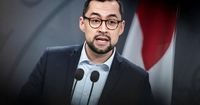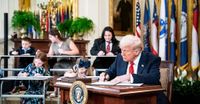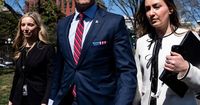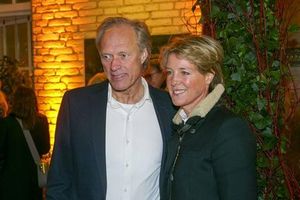On March 20, 2025, President Trump made headlines as he signed an executive order to drastically reshape the Education Department, a move long sought after by conservative circles. The East Room of the White House served as the backdrop for this momentous occasion, filled with eager children, conservative activists, and Republican governors from states such as Florida, Texas, and Ohio. As the president approached, he sought their encouragement: "Should I do this?" he asked a small boy, who nodded enthusiastically. The applause that followed marked not just the signing of an order but the culmination of decades of conservative wishes.
In late February, this administrative reshaping extended beyond education as a psychiatrist dealing with veterans found herself in a surprising new role. Under a recently instated return-to-office policy, she was ordered to conduct therapy sessions from a cubicle in an open office space, a striking policy shift for the Veterans Affairs administration, which had prided itself on its virtual health care capabilities long before it became a trend during the pandemic. This directive raised alarming ethical questions about patient privacy. "I’m ready to walk away if it comes to it," she communicated in a desperate text to her manager, revealing the turmoil within the agency as mental health services faced new hurdles.
As these domestic shifts unfolded, national security took a turn for the worse. On March 24, reports surfaced that Defense Secretary Pete Hegseth had revealed classified war plans in an unsecured chat group just two hours before a military strike against the Houthi militia in Yemen. Officials within the Pentagon expressed their shock over what they deemed an extraordinary breach of security. This incident also identified troubling parallels to past criticisms leveled against former Secretary of State Hillary Clinton regarding her use of private communication channels. Trump distanced himself from the controversy, stating he was unaware of the chat's existence.
Meanwhile, relations between the United States and Greenland reached a new low when Prime Minister Mute B. Egede condemned an upcoming visit from a U.S. delegation as "highly aggressive." This delegation includes Usha Vance, Trump's second lady, and Michael Waltz, the national security advisor. Egede denounced this visit as an inappropriate demonstration of U.S. power, encapsulating the tensions surrounding Trump's ambitions for Greenland, a territory he has openly expressed interest in incorporating into the United States. He further remarked, "This bounces off Donald Trump and his administration in their mission to own and control Greenland," revealing a sentiment among Greenlanders that they are being used as pawns in a larger geopolitical narrative.
Adding to Trump's busy agenda, he announced that the Kansas City Chiefs would celebrate their 2020 Super Bowl victory at the White House, an unusual invitation extended to a team that did not win its most recent outing against the Philadelphia Eagles in earlier matches. This decision stirred conversations about traditions surrounding championship visits to the White House and how Trump's administration has often turned these gatherings into politically charged events.
In an even more business-minded pivot, the White House also revealed plans to sponsor corporate support for its annual Easter Egg Roll, scheduled for April 21, 2025. potential corporate sponsors are being asked to contribute upwards of $200,000 for visibility at the historic event, raising eyebrows over possible ethical challenges. Richard W. Painter, a former White House ethics lawyer, emphasized that this approach could blur lines between public and private interests.
These actions by the Trump administration reflect a broader strategy that aims to consolidate power, reshape the landscape of American governance, and redefine the country's international relations— a theme resonant throughout Trump’s second term. Critics argue that this has put unprecedented strain on ethics in governance, national security, and international diplomacy. As the nation watches closely, the consequences of these directives will unfold, impacting not only immediate relations but setting a tone for future presidential administrations and their policies.







